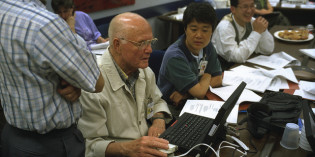Uncategorized

Disillusionment with democratic governance is common to both elite and citizen actors
Citizen disengagement from politics is a problem across much of the democratic world, with the public often not only disinterested, but actively hostile to politicians and policymakers. But is this growing cynicism limited to the public? Or are political and policy elites equally culpable of cynicism about the democratic process? Jack Corbett and John Boswell […]

Safe, secure, and sure to increase youth engagement: the Government should introduce online voting for UK elections
The Speaker’s Commission on Digital Democracy recently proposed introducing online voting in time for the 2020 General Election, an aspiration which looks well intentioned if ambitious. Here, the Chief Executive of WebRoots Democracy, Areeq Chowdhury, argues in favour of allowing voting via the internet on the grounds that the security risks are overstated and that […]

More than a theatrical flourish for the cameras: evidence under oath, perjury and parliamentary privilege
Select committees of both houses of Parliament have the authority to take evidence from witnesses under oath, and have chosen to do so during the current parliament. Alexander Horne looks at the issues, arguing that the decision to do so represents more than just a theatrical flourish for the cameras, and that the issue merits […]

The Digital Democracy Commission report is about far more than just digital
The Speaker’s Commission on Digital Democracy recently reported, recommending amongst other things that online voting be introduced in time for the next General Election. One of the Commission’s members, Cristina Leston-Bandeira, highlights the key elements of the report, and expresses hope that real change could be afoot. After a year of extensive consultation across the […]

Policymakers should be considering the impact on media plurality of digital intermediaries such as Facebook
To conclude with the LSE Media Policy Project’s Plurality Dialogue series, Damian Tambini addresses the most crucial questions that policymakers should be considering with regards to the role that digital intermediaries play in the democratic process. Similar PostsIt’s 2014 and we’re still implementing Leveson Inquiry recommendations

The departure (and return) of “Page 3”: the media’s conflicted relationship with cover-ups
The Sun recently announced (via fellow Murdoch organ the Times) that Page 3 – the daily appearance of a topless model in the paper – was to be scrapped. Two days later, the Sun itself announced that after the briefest of hiatuses, it was to return. The press coverage of the whole affair was, according […]

Book Review: The Power to Dismiss: Trade Unions and the Regulation of Job Security in Western Europe by Patrick Emmenegger
Job security regulation is often the focus of passionate debates among scholars, policy-makers and the general public at large. In this book Patrick Emmenegger offers a comparative account of the development of employment protection in eight Western European countries. The thorough analysis of the historical evolution of each national regulation is a relevant contribution offered […]

The mounting number of anomalies in our constitutional arrangements may lead to the Union’s eventual demise
Constitutional reform is a key issue for the future of democracy, and an important theme for Democratic Audit UK in the run up to the UK general election. Andrew Gamble asks whether the Union can be sustained in the long term with a growing number of questions about an English parliament. He argues that unless Unionists can […]

Interview: Professor Susan J. Carroll on the barriers facing women in politics on both sides of the Atlantic
Democratic Audit’s Sean Kippin and USApp’s Chris Gilson recently interviewed Professor Susan Carroll, the Author of More Women Can Run: Gender and Pathways to the State Legislatures to coincide with an event at the LSE. They discussed American and British politics, and the different challenges faced by aspirant female politicians and established woman leaders. Similar PostsEvidence from […]

Individuals exposed to political violence are less likely to support compromises in peace talks
What impact does political violence have on attitudes toward peace negotiations in conflicts such as those in Ukraine or Israel-Palestine? Daphna Canetti, Sivan Hirsch-Hoefler and Stevan Hobfoll present findings from a survey of Israelis and Palestinians on the effect of political violence on their attitudes toward peace. They find that contrary to the notion that force […]


 Democratic Audit's core funding is provided by the Joseph Rowntree Charitable Trust. Additional funding is provided by the London School of Economics.
Democratic Audit's core funding is provided by the Joseph Rowntree Charitable Trust. Additional funding is provided by the London School of Economics.